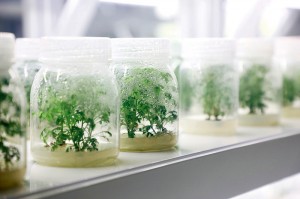Recently, scholars at home and abroad have discovered that in addition to anti-malarial, artemisinin has many other effects.
1. Fight against tuberculosis. A Michigan State University study found that artemisinin can help treat tuberculosis and slow the evolution of TB resistance.
Researchers have found that artemisinin can fight tuberculosis by disrupting Mycobacterium tuberculosis and shutting it down, causing the bacteria to die in an oxygen-deficient environment.
2. Inhibit the growth of cancer cells. Xiao Youli’s research group from the Institute of Plant Physiology and Ecology, Shanghai Institutes for Biological Sciences, Chinese Academy of Sciences found that the unique structure of artemisinin can inhibit the growth of cancer cells.
The researchers synthesized a small molecule probe with artemisinin as the backbone, and found that artemisinin can disrupt multiple normal physiological pathways of cancer cells, thereby inhibiting the growth and proliferation of cancer cells.
3. It can treat trauma. Researchers at Queen Mary University of the United Kingdom published a report on December 12 that artemisinin drugs can effectively relieve organ failure caused by severe trauma and can be used to save the lives of severely injured patients.
The researchers used artesunate (the same mechanism of action as artesunate) to treat rats that had lost a lot of blood. The results showed that the drug protected the organs of the experimental mice and greatly reduced the incidence of organ failure. Researchers believe that artesunate reduces the body’s inflammatory response.
4. Dihydroartemisinin can induce apoptosis of liver cancer cells. Dihydroartemisinin is the main metabolite of artemisinin in the body, with better water solubility and stronger antimalarial efficacy. In recent years, many studies have shown that dihydroartemisinin has antitumor activity against liver cancer. A study found that dihydroartemisinin can induce tumor cell apoptosis and has anti-tumor effect.
5. Artemisinin research provides an important basis for the development of new anticancer drugs. “Journal of Cellular and Molecular Medicine” recently published an article: Researchers from the Chinese Academy of Sciences have systematically studied the potential anticancer activity and structure-activity relationship of artemisinin on ovarian cancer. Studies have found that dihydroartemisinin can effectively inhibit the growth of ovarian cancer and improve the efficacy of the chemotherapy drug carboplatin for ovarian cancer. This study provides an important experimental basis for the use of artemisinin compounds as new anticancer (adjuvant) drugs in clinical research.
6. Artemisinin derivatives can treat lupus erythematosus. A research group led by Zuo Jianping, a researcher at the Shanghai Institute of Materia Medica, Chinese Academy of Sciences, published a study in the journal Arthritis and Rheumatism, saying that artemisinin derivatives may be used to treat systemic lupus erythematosus. Researchers have demonstrated that artemisinin derivatives have good efficacy and novel immune regulation mechanisms, can significantly improve lupus erythematosus-related symptoms and disease process, reduce the incidence of fatal lupus nephritis, and significantly prolong the life cycle of patients. Drug therapy targets for systemic lupus erythematosus have positive implications.
Post time: Jul-25-2022





